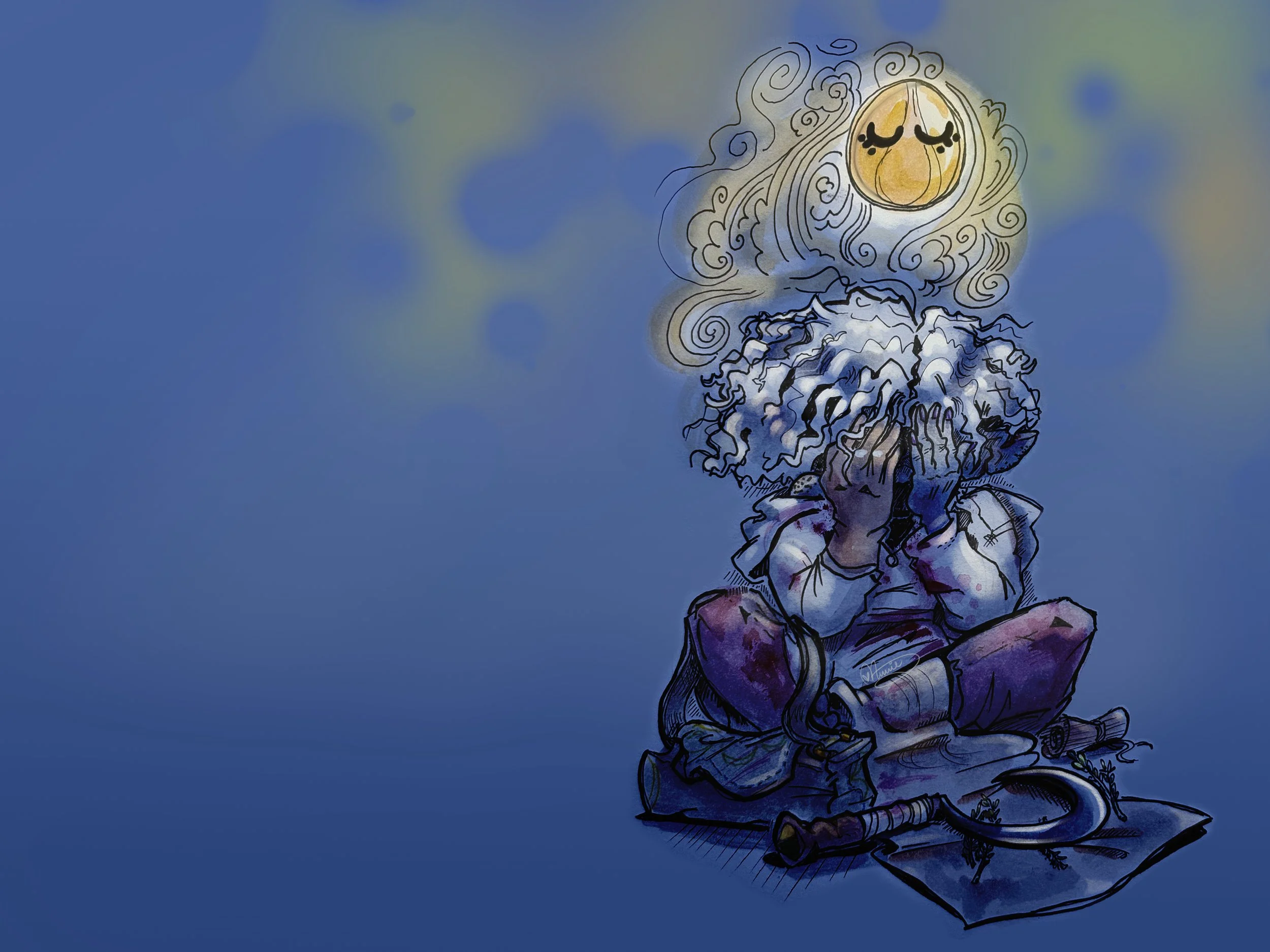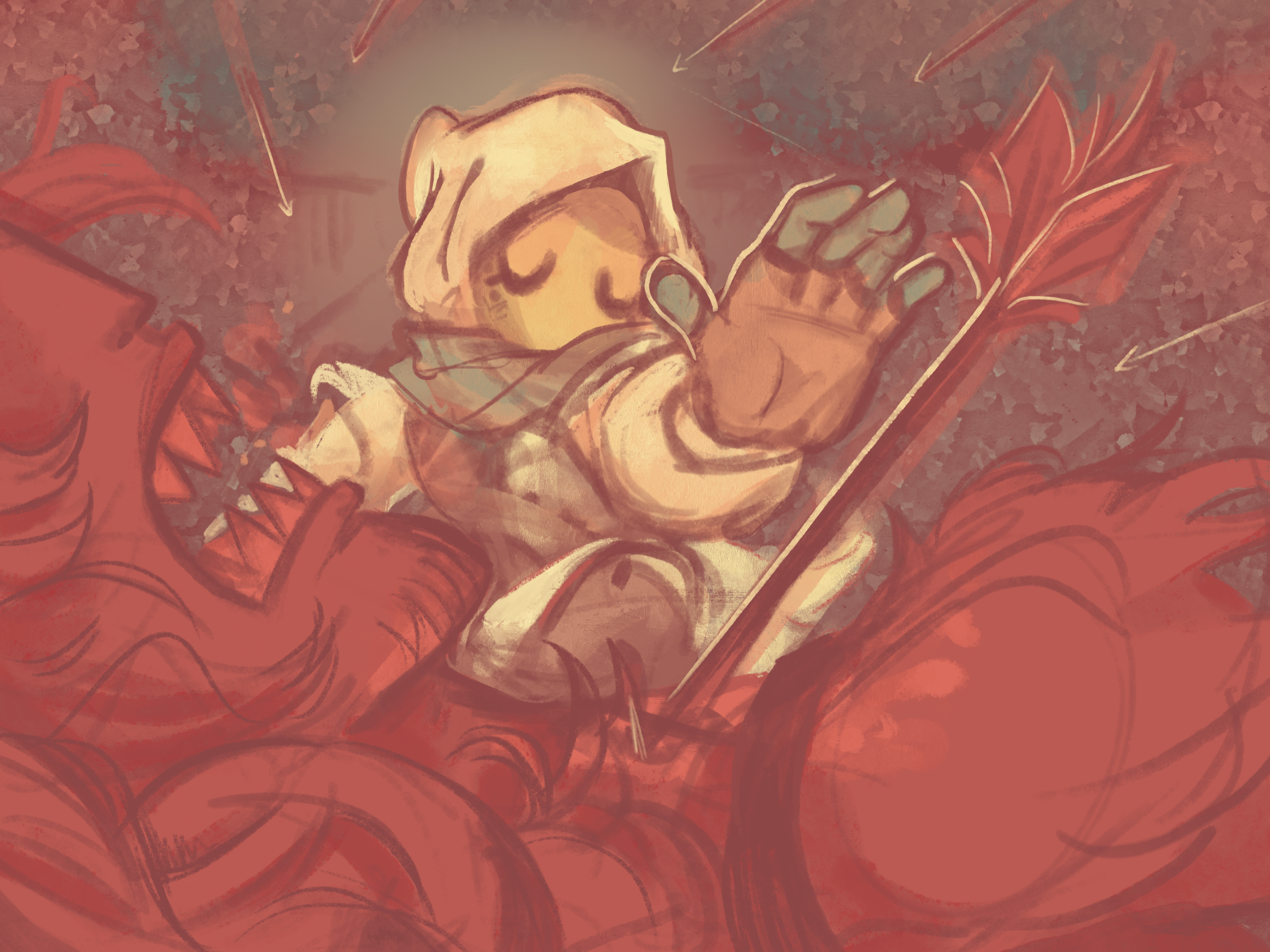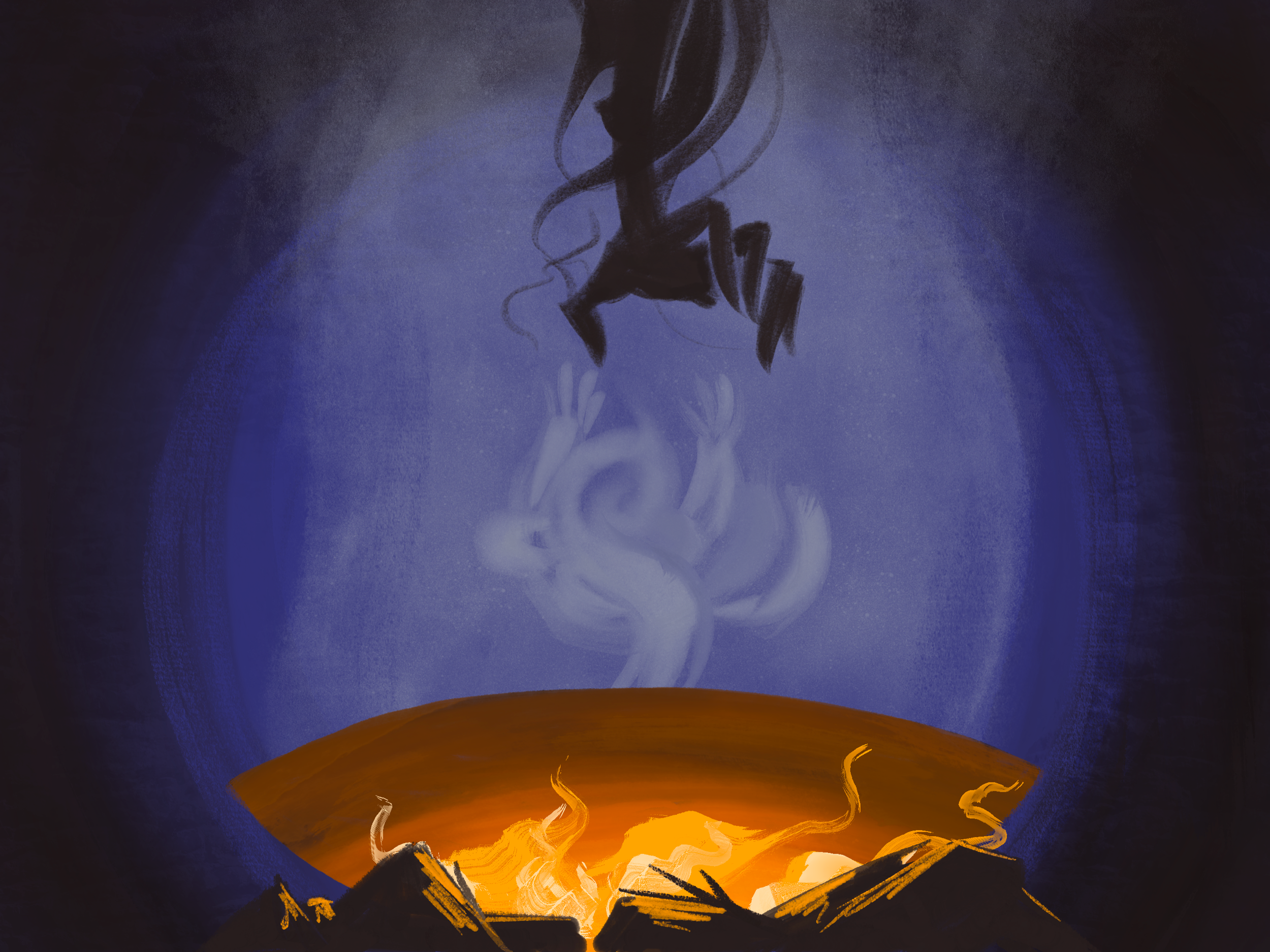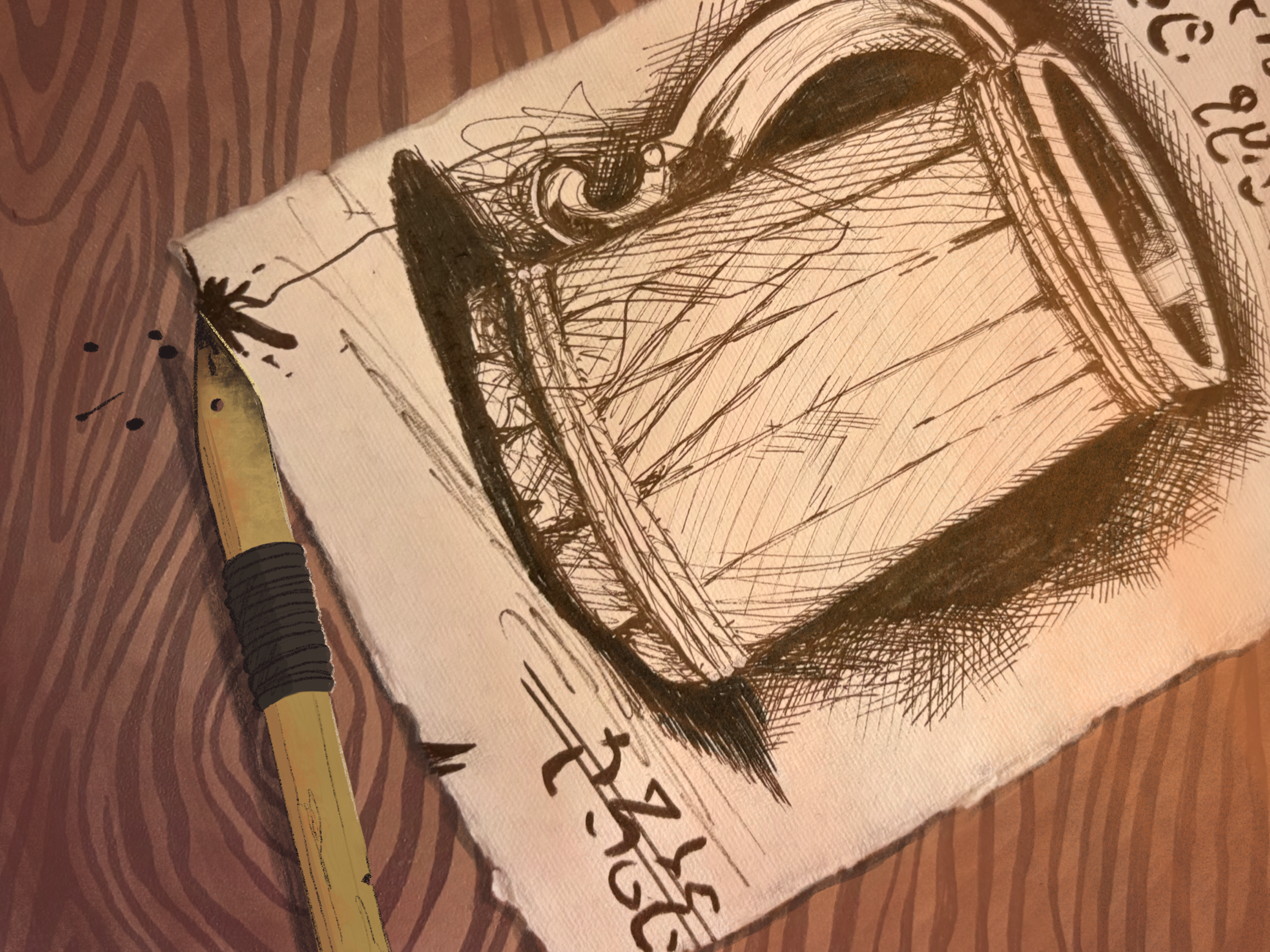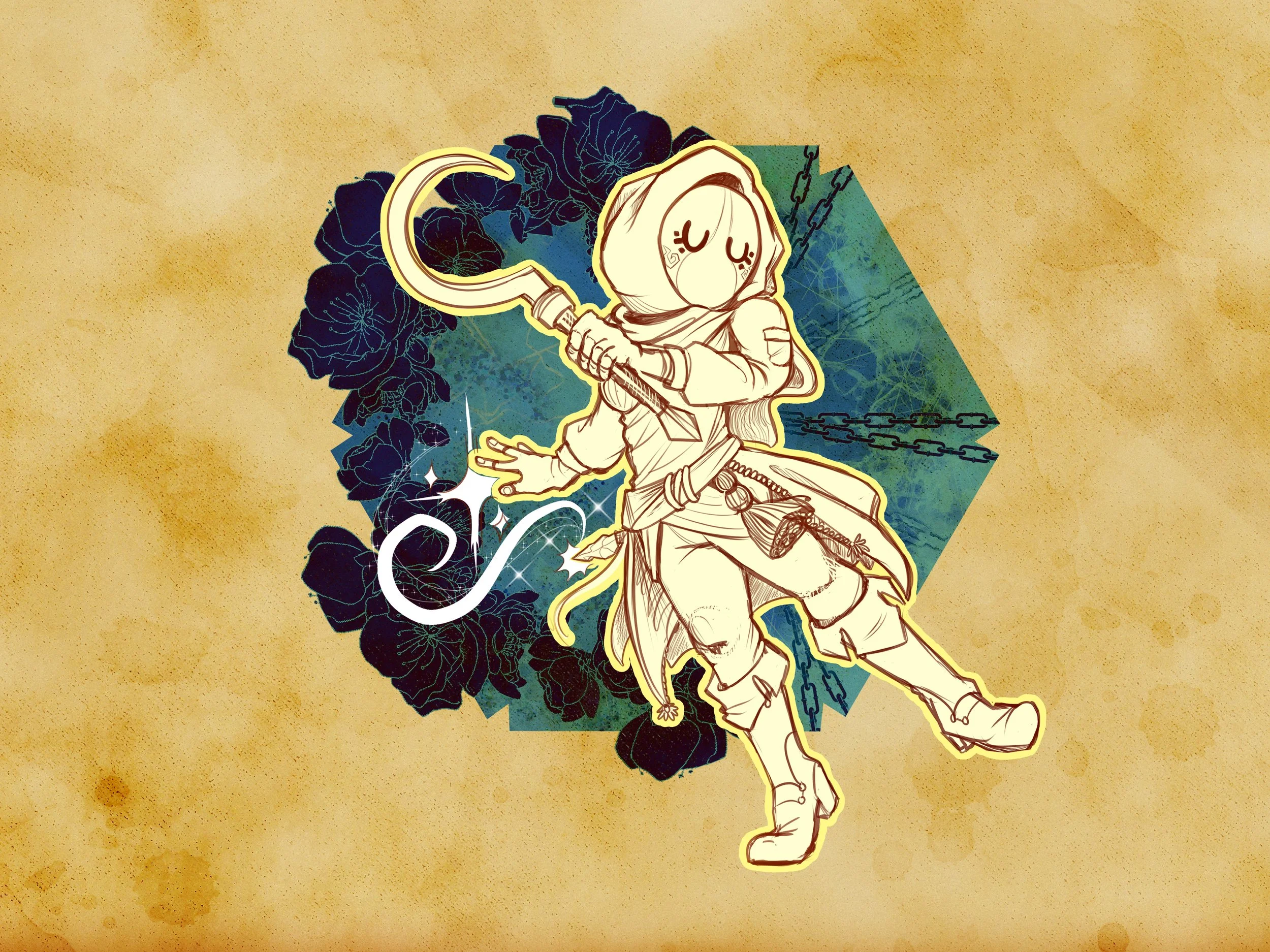Fanesca: Entry Nine
I think this was… my last restful morning.
Ninth Entry
There was an evening, not long after my focus was repaired, when we were riding back from a favor we’d resolved for a mysterious necromancer of Thay. Speaking with the woman he asked us to find had been, unnerving, yes— but surprisingly simple in the end. We were now in possession of a “summoning candle” that we would light when we wanted to request the services of the disconcerting wizard. Finnegan and Jack seemed to be in good spirits about having a powerful mage at our beck and call when it was needed. I, personally… I would rather not owe favors to anyone.
I laid in the corner of the cart, watching the branches above drag lazy lines across the pink-lined clouds through the tears in the tarpaulin. Sleep tugged at the edge of me, but my arcane reserves were full and restless, so my mind wandered restlessly along with them.
Where would we go next? Would Phandalin always be our base of operations after we finally clear that cellar? Which of my companions would surprise me next?
I had to start rewriting everything I thought I knew about Ragar. She constantly had me second-guessing every offer for help, every tactical suggestion, every look she threw my way. But I will not deny, those broken expectations have made for a valuable study. Women were always so contained in the little box that was once my world. Ragar, by contrast, is unrelenting, unpredictable. At times I catch glimpses of something softer in her—maybe even maternal—but those glints vanish quickly, leaving her as unreadable as ever. Still, I owe her something: she’s taught me to expect the unexpected.
Jack’s patience was beginning to fray. Usually the one to keep the calm, it unsettled me to see him openly losing his temper with her. He’d already approached a few of us, asking whether it was time to consider removing her from the group. The concern was unanimous. The action, less so. We are balanced in number and strong together, and companions willing to fight like this are rare. We kept holding the conversation off. Still, I worried Jack’s frustration might push him to do something… premature.
So my ears always sharpened a little when he spoke during those tense days. That evening, in the cart’s gentle rattle and sway, I overheard him speaking with Raph’æl up front. I hadn’t meant to listen—honestly—but I was closest. And if they were planning something against Ragar, I wanted to be prepared for the fallout.
But that wasn’t the subject of the evening.
I shifted slightly, just enough to hear Jack say, “—I didn’t get a chance to ask about your tale. You asked for mine, after all.”
I froze. Raph’æl’s tale?
No. This wasn’t mine to hear. If I ever lost my mind enough to tell someone about my past, I certainly wouldn’t want anyone listening in from the shadows like this. I should’ve turned away.
But curiosity pulls stronger than sleep.
Raph’æl sighed. “If you knew something that would put your friends in danger… but you were afraid of what they’d think of you… do you think they’d have a right to know?”
I regretted listening immediately. That single question mirrored my own struggle too perfectly. It almost felt… staged! Like they knew, like this was some elaborate ruse to coax me out of hiding.
No. That’s absolute nonsense.
Do NOT compare these men to what Temenos put you through.
You can trust them.
I repeated the words like a loving hymn, letting them soothe me in a voice not unlike liquid gold: I can trust Jack and Raph’æl.
Though I didn’t lean in, didn’t strain to hear the words he murmured in shame, I still listened. I decided—no matter what or how much I heard—that I would not judge.
Raph’æl’s story… his true story… is a weight I was never meant to carry, and yet, now that I do, I cannot imagine discarding it.
I cannot recall the last time I shed tears over someone else’s pain. Not without them watching, anyway. But the moment he said her name—Amelia—something inside me curled tight. A little girl, younger than even I was when the Messengers deemed me “divine” enough to take part in their rites. Her body, her voice, her very soul devoured from the inside. And instead of helping her, Raph’æl… Raph’æl ran.
It wasn’t cowardice. I won’t let myself call it that. It was fear. Pure, mortal fear. I know its flavor all too well. I’ve tasted it in my throat before every ritual. I’ve swallowed it like ash every time I look into the eyes of someone I care for and lie to protect them.
But he made a deal. A verbal contract. With something divine, or something pretending to be. I haven’t decided which is more terrifying. And he let that girl’s soul go. He traded her to survive.
And I understand. Gods forgive me, I understand.
No wonder that eater of shame grasped him so firmly in that cellar. He carries that weight every day—cast out, cast down, disowned by the very family and faith that raised him. And still, he heals. Still, he helps. As if by doing enough good, he can fill that hollow space Amelia left behind. He wears his guilt like armor, and still wonders if any of us would flinch if we knew the truth.
Raph’æl Ward. You lovely fool. Of course we’d flinch. Of course it would hurt to hear. But the fact that it hurt you to tell it… that makes it so different.
I didn’t say anything, of course. I just lay there in the cart, pretending to doze, pretending not to see Jack’s furrowed brow, or the way your voice cracked like glass when you spoke her name.
I’ve lived so long believing no one else could know the depth of shame that I do. But tonight, for the first time in ages, I don’t feel alone in it.
Would you… find comfort in knowing that from me?
I don’t think I’m brave enough to find out.
And in just that fact alone… you are braver than I could ever hope to be.
———
Back in Phandalin, we scattered in the way we usually do. Jack wandered off to peruse the armory, no doubt mumbling criticisms under his breath. Raph’æl peeled away toward the town hall to collect our reward for the orc situation, Smeak following closely at his heels. Super marched straight to the market square, vanishing into a vat of brine with joyful commitment. Finnegan strolled towards the tavern in search of conversation. And Ragar… well, she dissolved into the shadows like she always does. Off either chasing secrets or delivering them.
As for me, I turned to the provisioner’s shop, pockets full of small, sparkling victories.
I traded away a few gems that had no resonance with my arsenal—beautiful, but magically inert. In return: 94 gold pieces. It hit me just how it was hard to believe that only a month had passed since I started journeying with these strangers-turned-allies, and already I’ve earned enough to keep me safely housed and fed for months. But renting a room in someone else’s home? That was never the dream.
I don’t want a lease. I want land. A home all my own. A porch wide enough to dance on, a vegetable garden rich with herbs for all the teas I’ve yet to try, and a lattice of windows to banish every last shadow. I’ve had enough darkness for one lifetime. And while I may never match Ragar’s ruthless efficiency in gathering riches, I can be frugal. Frugal enough to someday build something from the ground up.
I wandered the town a bit longer than I should’ve, admiring the details of others’ homes—flower boxes, moss gardens, cheerful painted shutters—and mentally tucked away the ideas for my future sanctuary. Would the others think me childish for such dreams? I couldn’t say. But even if they did, it lightened something in me, just for a while.
By the time I made my way back to the square, the pink sky had melted into dusk and the lamps were being lit. The others had already gathered at the job board, shadows dancing across their forms in the flickering amber light. Super, of course, was keenly watching the moths circling the nearest flame, as if studying them might unlock some ancient truth… or he was just hungry. Jack and Raph’æl were weighing two separate postings pinned to the same region: a missing person and a questionable recruitment ad. It seemed likely we could pursue both in a single venture—two birds with one stone, they say?
But my eyes snagged on a third flyer. My heart sank like a rock tossed in still water.
Sildar, ever patient, ever loyal, was still looking for help retrieving Gundren.
How long has it been since that cave? Since we split paths with that earnest, hopeful man? I fear we’ve already taken too long. I can’t imagine what condition he must be in. Hope cannot sustain a man through every torture.
Still, the others had clearly already come to an agreement. Assuming King Grol’s influence has only grown, we’ll need more training, more gear… perhaps even more hands, if we’re to stand a chance.
The following week, I found myself entangled in a ridiculous (but oddly satisfying) project—trying to bind my casting components onto my wand without interfering with its core. The tanzanite crystal at its tip, brilliant and deep as twilight, serves as my arcane focus —the needle to my threading of the Weave. It hums when I use it, as if it recognizes me. I didn’t want to dull that song.
With the help of a local tanner, I crafted a fine braided leather strap—strong enough to hold the components in place, but soft enough not to damage them. Inspired by the diamond pattern etched into the filigree of Jack’s strange weapon, I netted the leather onto the space beneath the crystal in a similar motif. In the end, the thing looks more like a shekere than a wand… and it makes a soft, pleasant rattle when I cast.
It’s absurd. It’s lovely. It’s mine.
And I’ve just added “wooden wind chime” to the ever-growing list of things I’ll need in my future home.
———
The morning before we set off to find the missing druid felt painfully, deceptively ordinary.
From inside my tent, the veil of night slowly lifted, replaced by birdsong swaying through the dawn. Jack was still soundly unconscious—his usual post-tavern slumber, peaceful as a stone in the grass. Super, as ever, was half-drowned in his sleeping vat, mumbling impossibly obscene nonsense to no one in particular. Raph’æl’s tea set clinked softly against the hotstone as he prepared our morning blends, pretending—poorly—that he and Finnegan hadn’t just returned from another of their covert mercy missions. And Smeak, little gremlin that he is, was already scratching at Ragar’s tent flap, chirping raspy greetings as he tried to rouse his adoptive “mama” from whatever godless sleep she sinks into each night.
There’s a rhythm to mornings now. Familiar. Fragile.
As for me, I began the day as I always do—sitting with my back to the aperture of the tent, mask cradled in my lap, eyes meeting the reflection of my unguarded self. Each scar. Each burn. Each blemish. None of them deserved… and all of them survived. I take a breath. I count my coin. I clean my clothes with a whisper and a flick. And then—only then—I am ready to be seen.
I’m always the first to eat. It’s easier that way. A grateful bow towards my elven ally, retrieve the first plate, and return to the tent to eat in solitude—away from eyes, away from questions. By the time I emerge again, it’s for tea. Not to drink it, really. I just like the warmth of the cup. The smell of it always seems to rewrite the few sweet scents I still remember. And watching the others cradle their mugs, each flavor steeped in some personal, half-told story, always gives me a kind of peace I don’t yet have a name for. I’d drink the tea eventually. I don’t mind delaying satisfaction. I’m good at it.
We set out soon after.
The trail brought us dangerously close to Neverwinter Wood, to a place swallowed by time and rot. An old, forgotten town called Thundertree. Or at least, that’s what the rusted sign on the ground claimed. Whatever life had once existed there was long gone—smothered by brambles and diseased roots that clawed through broken cobblestone and empty thresholds. The forest hadn’t just reclaimed the place. It had infected it.
We split up cautiously, sweeping the overgrown paths, eyes sharp. It didn’t take long for unease to settle in my gut. The wind held still. The branches didn’t sway. It felt as though the very flora were watching us, slow and silent and patient. I almost called out when Super scurried up a tree like a sugar-addled squirrel. But I bit my tongue. I wasn’t certain enough to trust my nerves. Not yet.
He landed like a cat from an impossible height—barely a sound. “We’re about two-thirds in,” he said, gesturing lazily. “Saw a square with a statue about five homes that way.” Then he jabbed a thumb behind him toward the hill. “Oh, and there’s a dragon flying lazy circles around a wizard’s tower back there. Pretty cool.”
A dragon.
You could feel the tension ripple through the group like lightning on the skin. We’d barely survived goblins and orcs. What in all the realms did we think we could do against a dragon?
My thoughts were interrupted—rustling from behind the bramble wall. And then they came.
The trees were watching. More than that—they were waiting. Roots split, branches curled, and the forest itself stepped forward to meet us, revealing the Twig Blights hidden in the undergrowth.
I knew something was wrong. I should’ve said something. I should’ve trusted my instincts.
But hindsight offers little comfort when you’re under siege.
We ran for cover. Not to desert, but to regroup. I could feel it among the collective— we were tired of running.
Tensions truly began when one of the Twig Blights managed to catch Ragar by the ankle, trying to root her down like a weed in fresh soil. She didn’t scream. Just grit her teeth and drove her dagger into its gnarled mass again and again until it let go. The strength of the strikes shook them, but didn’t scatter them. We were surrounded—swarmed by splinters and brittle claws—caught between the need to defend ourselves and the far more pressing need not to draw the attention of the dragon circling overhead.
As with most of our dilemmas, I wasn’t expecting a talking bush to provide the solution.
A creature—humanoid, but disguised in what was either brilliant camouflage or a poor attempt at art therapy—waved us down with frantic whispers. He looked like any other bramble until he moved, beckoning us toward him out of nowhere as if he’d just grown tired of being still.
We had no better options. The others gathered quickly, and we followed him through narrow, hidden paths, his steps practiced, familiar—as though the twisted trails of Thundertree were his home.
“Quick, get in,” he hissed once we reached a building that hadn’t yet crumbled under time or rot.
We piled in blindly, ducking beneath the low doorframe just as the heavy wingbeats passed overhead.
We’d narrowly escaped the dragon’s gaze. For now.
Inside, we found something unexpected: a group of humans, all very much alive, oddly well-kept, and in disconcertingly good spirits. The bush-man peeled off his disguise only briefly, revealing that yes, he was in fact one of them—not some kind of hedge-born druid—before returning to his comfort of thorns. Whether that role was assigned or self-imposed, I wasn’t sure. I didn’t ask.
Their leader spoke up soon after: a man who introduced himself as Alister Sandborne.
He spoke with measured poise and a peculiar lilt, clad in robes that were… deeply suspect. Dragonborn motifs—scaled embroidery, bronze accents, ornamental clasps shaped like talons. I couldn’t help but glance sideways at Jack. He didn’t react, not really. But I saw something twitch in his jaw. The same restraint he’d worn when we met the townmaster.
To clarify: I found Alister’s voice concerning, not because of its tone—he was in fact disturbingly cheerful—but because of what I heard beneath it. There was something hollow in the joy. Hollow and familiar. The way he spoke about dragons, with reverence wrapped in casual ease, didn’t quite match the reverence that should’ve accompanied it. He called himself a student of draconic lore. Said he and the others were “called here” to study.
That was when it clicked.
The flyer. The recruitment ad. The promise of purpose.
Oh.
My wand twitched in my grip. I held it tighter. My stomach turned violently.
I’d felt this before. That jubilant sense of belonging, held just long enough to blind you from what they plotted for you to become. The tremble in my fingers, the whisper of old chants I didn’t want to remember, the rattle of knocking doors echoing in my skull—
This wasn’t a research group.
This was a cult.

